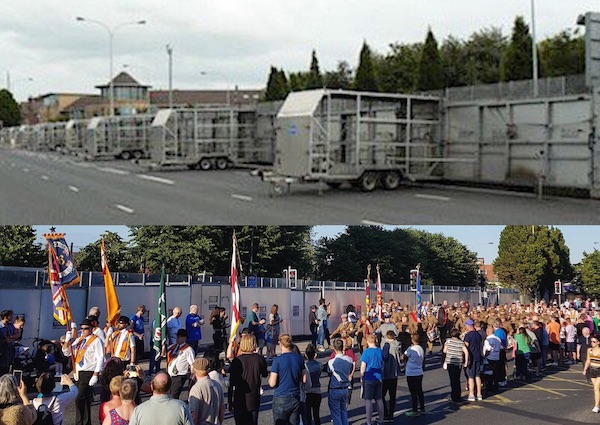
Steel barriers sealed off the nationalist Short Strand last Monday to facilitate the passage of a sectarian parade by the anti-Catholic Orange Order, infuriating local residents but without causing any of the violence seen in previous years.
The PSNI police said some disruption for the parade, held annually in the first week of July, “was to be expected”. They said that there had been “no issues or disorder” in any part of the city linked to the march.
Other major parades passed without violence, as the Protestant marching season builds for its climax next Thursday, when hundreds of parades are held to mark the Twelfth of July, the anniversary of a Protestant battle victory over Catholics in 1690.
A new parade to ‘float the banner’ through a mixed area of north Belfast, that had raised fears of creating a new flashpoint, also passed quietly. The procession through Kilcoole was held to deliver a banner to the home of the Orange Order’s new “worshipful master”.
The Parades Commission said it had received “substantial” representation from residents, although the march ultimately passed off without a protest. The parade was the first application from a “re-established” lodge.
The annual Whiterock Orange Order parade in northwest Belfast also passed off peacefully at the weekend. For the third successive year it was restricted from passing a nationalist section of the Springfield Road.
The annual Drumcree parade, which caused intense violence in the 1990s, takes place tomorrow, Sunday 7 July, but only a token protest is expected from unionists who are again rerouted from the nationalist area of Portadown.
This year marks the 20th anniversary of the last time the district lodge was allowed to conduct an infamously coat-trailing parade through the nationalist Garvaghy Road. Nevertheless, tensions remain in the area over an annual ‘junior’ Orange parade at the lower end of the road, as well as the construction of an Orange arch nearby.
There was a small protest in the Scottish town of Cowdenbeath last weekend, where DUP leader Arlene Foster addressed the Orange Order’s annual demonstration in the east of Scotland. A banner with the words “Love not hate” was hung from homes as the march passed through the town without the support of local residents.
From an erected stage, one Orangeman denounced Scottish-born James Connolly, a signatory of the 1916 Proclamation and a leader of the Easter Rising, as a “terrorist”, before shouting “No surrender”.
Another, wearing a sash and a chaplain’s collar, delivered a sectarian tirade against the town’s Catholic population. He said: “There are many in this town who are not only enemies of this institution, but who are enemies of Christ.”
Addressing the crowd, Foster ironically claimed the Orange Order is on the receiving end of bigotry and intolerance. “This country needs to be a shared place where people are able to live free from intolerance and hatred,” she said. “Such bigotry was not part of King William’s mindset and it should not be part of ours, nor directed towards us either.”
![[Irish Republican News]](https://republican-news.org/graphics/title_gifs/rn.gif)
![[Irish Republican News]](https://republican-news.org/graphics/title_gifs/harp.gif)

